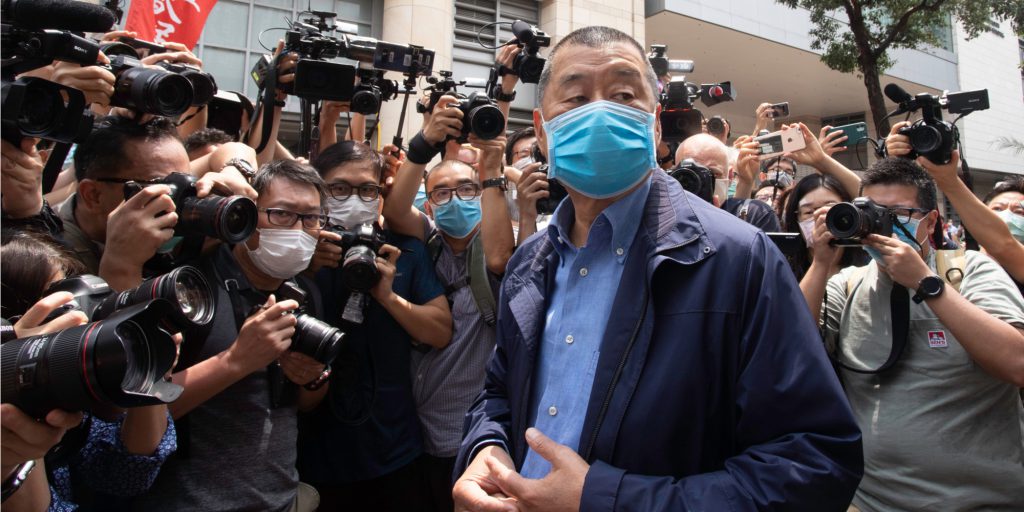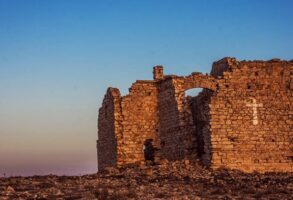
Published April 2, 2021
The news was expected, but that did not make it any less wrenching: newspaper publisher Jimmy Lai, veteran democracy activist Martin Lee, and other brave defenders of human rights were convicted in Hong Kong on a slew of offenses that had nothing to do with violating just laws and everything to do with challenging the lawlessness of Hong Kong’s communist Chinese rulers.
Still, there was something entirely appropriate about the story hitting the pages of American newspapers on Good Friday. Because for years now, Jimmy Lai and Martin Lee, two devout Catholics, have been walking the way to Calvary, along which they have met the Lord by conforming themselves to Christ and his redemptive suffering. That suffering was in service to the truth, as Jesus reminds Pilate in the Johannine passion account the Church reads every Good Friday. And these two brave Catholics, and their pro-democracy compatriots, are surely suffering for the truth.
That they have done so willingly, knowing full well what they were doing and what risks they were running, makes their witness even more Christlike.
One of the most striking characteristics of St. John’s passion narrative is that Jesus is in sovereign control of events throughout the story. The passion is emphatically not something that just happens to the miracle-working preacher from Nazareth; the passion is something Jesus embraces as the destiny appointed for him by the Father for the salvation of the world. So throughout John’s passion story, Jesus is in control of events: in the Last Supper discourse; in the garden at Gethsemane; in his confrontation with the Temple authorities; in his dialogue with Pilate; in his words from the cross to Mary and John – in all these dramatic moments, it is Jesus who drives the action forward. Thus his last words from the cross, “It is finished,” are the final proclamation of his messianic sovereignty: he has completed the work the Father sent him into the world to do and so he bows his head and gives up his spirit (John 19.30), in the ultimate act of obedience to the Father’s will.
Jimmy Lai and Martin Lee do not, of course, think of themselves in messianic terms. But their walking of Hong Kong’s way of the cross these past years has been a true imitation of Christ. Both men could have left the city they loved and lived comfortably elsewhere; both chose to stay and fight for the freedom they believe God wills for human beings created in the divine image and likeness. Both could have muffled their protests when the communist thugs in Beijing began to tighten the screws on Hong Kong, in blatant violation of China’s agreement with Great Britain when sovereignty over the city returned to China in 1997; instead, they amplified their voices of protest, even when, in Jimmy Lai’s case, the Beijing regime and its Hong Kong lackeys did everything in their power to ruin him financially.
Asked whether he had ever considered leaving Hong Kong under these pressures, 82-year old Martin Lee’s response was both unequivocal and unequivocally Christian: “If I have the choice of dying peacefully in bed outside Hong Kong, or dying in pain in a Chinese jail, the question for me is not how I die, but will I go to heaven? Dying without my convictions is what would really give me pain.”
Jimmy Lai, for his part, has manifested the depth of his Catholic faith by the serenity and calm with which he has faced his persecutors and jailers. In imitation of Jesus before Pilate, Jimmy Lai has neither flinched nor cursed; he has taken his stand on the truth, and thereby proven himself the nobler and stronger character in this drama. Since his imprisonment without bail, Jimmy Lai has not lived on anger or hatred; he has lived in faith, offering his suffering to the Lord and fed by the reception of Holy Communion brought to him in jail by another Catholic hero, Cardinal Joseph Zen, S.D.B.. The Vatican and the pope may not have time for Cardinal Zen; but Cardinal Zen has time for Jimmy Lai and other prisoners of conscience.
Jimmy Lai will keep fighting to the end, as will Martin Lee. They will fight, however, with weapons of the spirit and with real arguments – weapons that the brute force and lies deployed by the Beijing regime against them cannot match. In this, too, they are living the imitation of Christ. Both these Catholic prisoners of conscience may die in communist Chinese prisons. But they will be the real victors in the contest, because they will have remained faithful to the truth about human dignity they know as an essential part of their profound Catholic faith. And the just Judge of all will know what they have done, why they have done it, and in whose holy name they have done it. Believing that, they can fight on without rancor, nourished by the sacraments and prayer.
It is nothing short of scandalous that these brave men and others are facing such persecution without any public support from the Vatican: a default in moral obligation and duty made even worse because the Holy See continues to insist on the efficacy of its new arrangements and its “dialogue” with Beijing.
There is, however, still time for the Vatican to raise its voice and display the kind of courage Pope St. John Paul II showed in facing down thug regimes. When the show trials of Jimmy Lai, Martin Lee, and other Hong Kong human rights activists conclude with their inevitable convictions and these brave freedom fighters are consigned to Chinese prisons, the Beijing regime hopes the world will forget about them. That hope could be frustrated if Pope Francis, secretary of state Cardinal Pietro Parolin, and the Vatican’s chief diplomat, Archbishop Paul Gallagher, keep the names of Jimmy Lai, Martin Lee, and their fellow-dissidents alive in the international public square.
It is the very least the Church’s highest authorities can do for some of Catholicism’s bravest sons and daughters, who are walking the Via Crucis in imitation of the Lord, and in obedience to what they believe is their Christian and Catholic duty.
Jimmy Lai and Martin Lee are men of paschal faith. They know that the worst in human history happened on Good Friday and that God gave his answer to that on Easter Sunday. Knowing that, they can live as free men in the deepest sense of human freedom. May all their fellow-Catholics pray and work for Hong Kong’s freedom in solidarity with them. That is surely what the Lord who reigns from Calvary would want us to do.
George Weigel is Distinguished Senior Fellow of Washington’s Ethics and Public Policy Center, where he holds the William E. Simon Chair in Catholic Studies.











